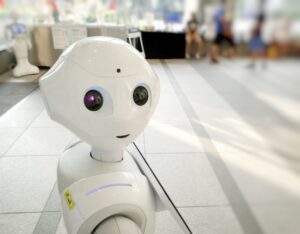Artificial Intelligence (AI) has become an increasingly prevalent force in modern technology, revolutionizing various industries and transforming the way we live, work, and interact. From virtual assistants like Siri and Alexa to recommendation algorithms that personalize our online experiences, AI has become an integral part of our everyday lives. Understanding the impact of AI on different sectors is crucial for individuals and businesses alike, as it presents both opportunities and challenges that need to be navigated.
The Rise of AI in Modern Technology: An Overview
AI refers to the simulation of human intelligence in machines that are programmed to think and learn like humans. It has evolved significantly over time, from its early beginnings in the 1950s to the present day, where it encompasses a wide range of technologies such as machine learning, natural language processing, and computer vision. AI is now capable of performing complex tasks that were once thought to be exclusive to human intelligence.
Examples of AI in everyday life are abundant. Virtual assistants like Siri and Alexa have become household names, providing us with information, managing our schedules, and even controlling our smart homes. Recommendation algorithms used by platforms like Netflix and Amazon analyze our preferences and behaviors to suggest personalized content and products. These examples demonstrate how AI has seamlessly integrated into our daily routines, making our lives more convenient and efficient.
AI and Its Impact on Everyday Life: A Closer Look
The impact of AI on everyday life is multifaceted. On one hand, it brings numerous benefits such as convenience and time-saving. Virtual assistants can perform tasks quickly and accurately, freeing up our time for more important activities. Recommendation algorithms help us discover new content or products that align with our interests, saving us from the overwhelming amount of choices available.
However, there are also negative effects to consider. One major concern is privacy. As AI collects vast amounts of data about individuals, there is a risk of this information being misused or falling into the wrong hands. Additionally, AI has the potential to displace jobs, as automation becomes more prevalent in various industries. While AI creates new job opportunities, it also eliminates certain roles that were previously performed by humans.
AI in Healthcare: Revolutionizing the Medical Industry
AI has the potential to revolutionize the healthcare industry by improving medical diagnosis and treatment. Machine learning algorithms can analyze large amounts of patient data to identify patterns and make accurate predictions. This can lead to earlier detection of diseases and more effective treatment plans. AI-powered robots can also assist in surgeries, reducing the risk of human error and improving patient outcomes.
Furthermore, AI enables personalized medicine by tailoring treatments to individual patients based on their genetic makeup and medical history. This approach has the potential to improve patient outcomes and reduce healthcare costs by avoiding unnecessary treatments or adverse reactions. AI can also help in drug discovery by analyzing vast amounts of data and identifying potential candidates for further research.
AI in Education: Transforming the Way We Learn
AI is transforming the education sector by enabling personalized learning and adaptive teaching. Intelligent tutoring systems can analyze students’ performance and provide tailored feedback and guidance. This individualized approach helps students learn at their own pace and address their specific needs, leading to better academic outcomes.
Additionally, AI has the potential to increase accessibility and affordability of education. Online platforms powered by AI can provide quality educational content to individuals who may not have access to traditional educational institutions. AI-powered chatbots can also assist students with their queries, providing instant support and guidance.
AI in Business: Boosting Efficiency and Productivity

AI is increasingly being used in business operations to boost efficiency and productivity. Chatbots, powered by natural language processing, can handle customer inquiries and provide support 24/7, reducing the need for human intervention. Predictive analytics algorithms can analyze large datasets to identify trends and patterns, helping businesses make informed decisions and optimize their operations.
Furthermore, AI can automate repetitive tasks, freeing up employees’ time for more strategic and creative work. This can lead to increased productivity and innovation within organizations. AI-powered tools can also enhance customer experiences by personalizing interactions and anticipating their needs.
AI in Transportation: Shaping the Future of Mobility
AI is shaping the future of transportation through advancements in autonomous vehicles and traffic management systems. Self-driving cars are becoming a reality, with companies like Tesla and Waymo leading the way. These vehicles have the potential to reduce accidents and improve transportation efficiency by eliminating human error.
AI-powered traffic management systems can optimize traffic flow, reducing congestion and travel times. These systems can analyze real-time data from various sources, such as sensors and cameras, to make informed decisions and adjust traffic signals accordingly. This can lead to smoother traffic flow and improved overall transportation experience.
AI in Agriculture: Improving Crop Yield and Sustainability
AI is playing a crucial role in agriculture by improving crop yield and sustainability. Precision farming techniques, enabled by AI, allow farmers to monitor crops more accurately and efficiently. Drones equipped with sensors can collect data on soil moisture, nutrient levels, and plant health, helping farmers make informed decisions about irrigation, fertilization, and pest control.
AI-powered algorithms can analyze this data to provide real-time recommendations for optimal farming practices. This can lead to increased crop yield, reduced resource wastage, and improved sustainability. AI can also help in predicting crop diseases or weather patterns, allowing farmers to take preventive measures and minimize losses.
AI in Entertainment: Enhancing the User Experience
AI is enhancing the user experience in the entertainment industry through personalized recommendations and immersive technologies. Recommendation algorithms analyze users’ preferences and behaviors to suggest content that aligns with their interests. This helps users discover new movies, TV shows, music, or books that they may enjoy.
Virtual reality (VR) and augmented reality (AR) technologies powered by AI are also transforming the entertainment experience. VR allows users to immerse themselves in virtual worlds, while AR overlays digital content onto the real world. These technologies provide users with interactive and engaging experiences, whether it’s gaming, watching movies, or exploring virtual museums.
The Ethical Implications of AI: Balancing Progress with Responsibility
While AI brings numerous benefits, it also raises ethical concerns that need to be addressed. One major concern is bias in AI algorithms. If the data used to train these algorithms is biased, it can lead to discriminatory outcomes. For example, facial recognition systems have been found to have higher error rates for people with darker skin tones. It is crucial to ensure that AI systems are fair and unbiased.
Another concern is accountability. As AI becomes more autonomous and makes decisions that impact human lives, it is important to establish clear lines of responsibility. Who is accountable when an AI system makes a mistake or causes harm? This question needs to be answered to ensure that AI is developed and implemented responsibly.
The Future of AI: What Lies Ahead for this Unseen Force?
The future of AI holds immense potential for further advancements and impact on society. Predictions include the integration of AI into various aspects of our lives, from healthcare and education to transportation and entertainment. AI has the potential to continue improving efficiency, productivity, and decision-making across industries.
However, realizing this potential requires continued research and development. It is important to invest in AI research, education, and infrastructure to maximize its benefits and mitigate its risks. Collaboration between academia, industry, and policymakers is crucial in shaping the future of AI in a responsible and inclusive manner.
AI has become an unseen force that permeates various industries and aspects of our lives. Its impact on healthcare, education, business, transportation, agriculture, entertainment, and everyday life is undeniable. While AI brings numerous benefits, it also raises ethical concerns that need to be addressed. Responsible development and implementation of AI are crucial to ensure that its potential is maximized while minimizing its risks. As AI continues to evolve, it is important for individuals, businesses, and policymakers to stay informed and actively participate in shaping its future.
If you’re curious about the fascinating world of AI behind the scenes, you won’t want to miss this insightful article on Vision AI. Discover how this cutting-edge technology is revolutionizing industries such as healthcare, transportation, and retail. From autonomous vehicles to facial recognition systems, Vision AI is paving the way for a future where machines can see and understand the world around them. Dive deeper into this topic by checking out the article on Vision AI from AITV.Media.



